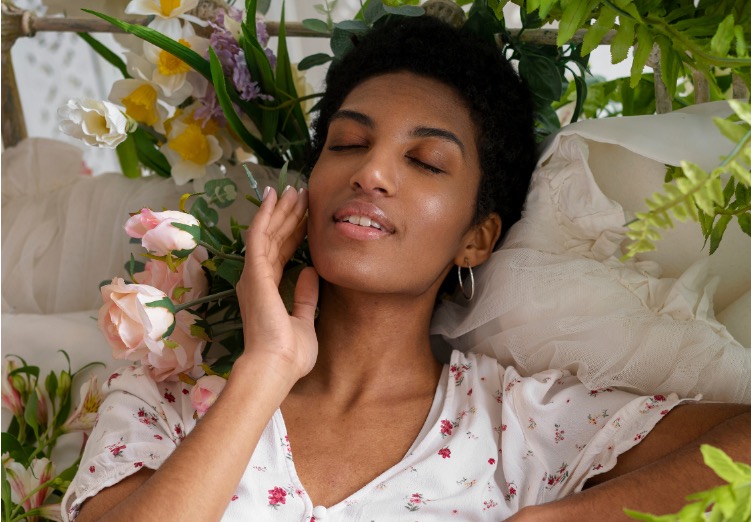
For many women, self-care has long been framed as a luxury, something reserved for rare days off or special occasions. But in truth, self-care is a quiet rebellion, a daily return to self in a world that constantly pulls us in every direction. It’s not always candles and massages. Sometimes, it’s boundaries. Other times, it’s saying no, or saying yes to your dreams. At its core, self-care lives in the rituals, those intentional, repeated acts that remind you of your worth, your roots, and your right to rest.
What is the meaning of rituals?
Rituals are intentional acts, often repeated, that hold personal or cultural meaning. They help us mark transitions, ground our energy, and create a sense of rhythm in daily life. Unlike habits, rituals are done with mindfulness and they’re not just about what we do, but how and why we do it. For African women, rituals can be sacred links to our heritage, healing, and self-affirmation, whether it’s morning devotion or prayer or dancing to reconnect with our bodies.
How to write your own rituals
Creating your own rituals starts with tuning in to what your mind, body, and spirit truly need. Ask yourself: What grounds me? What brings me joy? What helps me feel like myself again? From there, choose simple, meaningful actions you can repeat regularly like speaking declarations or affirmations each morning, brewing tea in silence, or journaling by candlelight. Write them down, name them if you like, and treat them as sacred. The power of a ritual lies in the intention behind it, not its complexity.
Here are seven everyday rituals that we believe are redefining what self-care looks like, not just for our bodies, but for our minds, spirits, and identities.
1. Morning Silence: Choosing Yourself Before the World Chooses You
Before the phone starts buzzing and the demands of the day come knocking, try giving yourself 10 minutes of sacred silence. Whether it’s in prayer, meditation, or quiet journaling, this ritual is about centering yourself – mind, body, and spirit – before offering your energy to anyone else.
In Yoruba tradition, mornings are sacred. Many elders begin the day with oríkì (praise poetry) to affirm their identity and purpose. What if your self-care started with affirming who you are?
2. Sacred Baths with Native Botanicals
Water is healing and when infused with purpose, it becomes transformational. Across many African cultures, bathing is more than hygiene; it’s a form of spiritual renewal. Try adding ingredients like neem leaves, eucalyptus, shea bark, or even sea salt to your bath. As you soak or pour the water over yourself, visualize cleansing your body and spirit of any heaviness.
Rituals like these, practiced weekly or monthly, can feel like a full-body exhale.
3. Food as a Love Language to Yourself
Prepare a meal from your heritage with mindfulness and intention, not for others but for you. Whether it’s egusi, matoke, waakye, injera, or groundnut stew/soup, cooking can be meditative, creative, and deeply nourishing. Let the process be slow. Play music from home. Taste everything. Sit down and eat without rush or guilt.
Feeding yourself well is one of the most powerful ways to honour your body and culture.
4. Storytelling and Sister Circles
Sometimes self-care looks like gathering. In traditional African societies, storytelling and communal dialogue were forms of healing and identity-building. Recreate this by hosting intimate gatherings – whether it’s a monthly dinner, virtual chat, or group journal session – with women who make you feel seen.
There’s therapy in shared laughter, honesty, and safe space.
5. Soulful Movement: Reclaiming Your Body with Joy
Forget punishing workouts or trendy fitness goals. Try dancing in your living room to your favourite Afrobeats playlist, taking evening walks in your neighborhood, or learning a traditional dance form from your region.
Movement doesn’t have to be a task, it can be an act of freedom. Your body deserves joy, not just discipline.
6. Saying No Without Guilt
Many African women are raised to serve, to be available, agreeable, dependable. But self-care sometimes means saying no without explanation, guilt, or apology.
Start with one thing a week. Decline that meeting that could be an email. Say no to the gathering that drains your energy. Each time you protect your space, you reclaim your power.
7. Reclaiming Rest as a Right
Rest is resistance. In societies where Black women are praised for how much they can endure, choosing to rest is revolutionary. Midday naps, tech-free evenings, and sleep that isn’t sacrificed for hustle; these are not signs of laziness but rather acts of healing.
Remember: you are not a machine. You are a living, breathing woman with a soul that needs space to exhale.
Redefining self-care means rewriting the script that says you must earn rest, deserve joy, or prove your worth. True self-care is not a performance but instead a return to wholeness. And for the African woman navigating a world that often forgets her needs, these rituals are more than practices. They are declarations:
I matter. I deserve softness. I choose myself.
